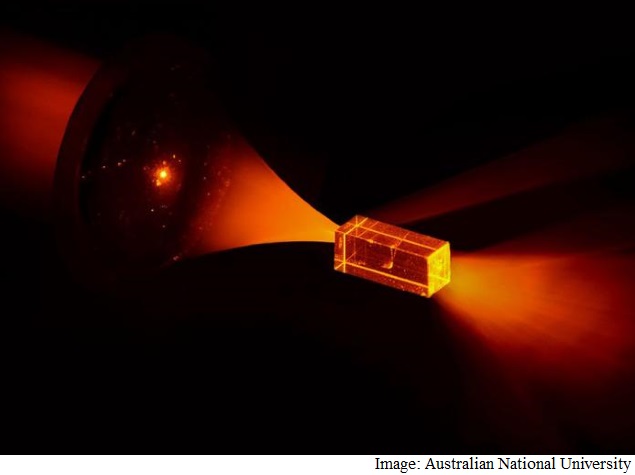- Home
- Science
- Science News
- Prototype Quantum Storage Device to Usher in Encrypted Global Network
Prototype Quantum Storage Device to Usher in Encrypted Global Network

This improves the storage time by a factor of more than 100 for a prototype quantum hard drive.
The team's record storage time of six hours is a major step towards a secure worldwide data encryption network based on quantum information, which could be used for banking transactions and personal emails, researchers said.
"We believe it will soon be possible to distribute quantum information between any two points on the globe," said lead author Manjin Zhong, from the Research School of Physics and Engineering (RSPE) at the Australian National University (ANU).
"Quantum states are very fragile and normally collapse in milliseconds. Our long storage times have the potential to revolutionise the transmission of quantum information," said Zhong.
Quantum information promises unbreakable encryption because quantum particles such as photons of light can be created in a way that intrinsically links them.
Interactions with either of these entangled particles affect the other, no matter how far they are separated.
The team of physicists at ANU and the University of Otago stored quantum information in atoms of the rare earth element europium embedded in a crystal.
Their solid-state technique is a promising alternative to using laser beams in optical fibres, an approach which is currently used to create quantum networks around 100 kilometres long.
"Our storage times are now so long that it means people need to rethink what is the best way to distribute quantum data," Zhong said.
"Even transporting our crystals at pedestrian speeds we have less loss than laser systems for a given distance," said Zhong.
"We can now imagine storing entangled light in separate crystals and then transporting them to different parts of the network thousands of kilometres apart. So, we are thinking of our crystals as portable optical hard drives for quantum entanglement," Zhong added.
After writing a quantum state onto the nuclear spin of the europium using laser light, the team subjected the crystal to a combination of a fixed and oscillating magnetic fields to preserve the fragile quantum information.
"The two fields isolate the europium spins and prevent the quantum information leaking away," said Dr Jevon Longdell of the University of Otago.
The research was published in the journal Nature.
For the latest tech news and reviews, follow Gadgets 360 on X, Facebook, WhatsApp, Threads and Google News. For the latest videos on gadgets and tech, subscribe to our YouTube channel. If you want to know everything about top influencers, follow our in-house Who'sThat360 on Instagram and YouTube.
- Samsung Galaxy Unpacked 2025
- ChatGPT
- Redmi Note 14 Pro+
- iPhone 16
- Apple Vision Pro
- Oneplus 12
- OnePlus Nord CE 3 Lite 5G
- iPhone 13
- Xiaomi 14 Pro
- Oppo Find N3
- Tecno Spark Go (2023)
- Realme V30
- Best Phones Under 25000
- Samsung Galaxy S24 Series
- Cryptocurrency
- iQoo 12
- Samsung Galaxy S24 Ultra
- Giottus
- Samsung Galaxy Z Flip 5
- Apple 'Scary Fast'
- Housefull 5
- GoPro Hero 12 Black Review
- Invincible Season 2
- JioGlass
- HD Ready TV
- Laptop Under 50000
- Smartwatch Under 10000
- Latest Mobile Phones
- Compare Phones
- iQOO Z10 Turbo Pro
- iQOO Z10 Turbo
- CMF by Nothing Phone 2 Pro
- Motorola Edge 60
- Motorola Edge 60 Pro
- Motorola Razr 60
- Motorola Razr 60 Ultra
- Realme 14T 5G
- HP EliteBook 6 G1a
- HP EliteBook 8 G1a
- Honor Pad GT
- Vivo Pad SE
- Moto Watch Fit
- Honor Band 10
- Xiaomi X Pro QLED 2025 (43-Inch)
- Xiaomi X Pro QLED 2025 (55-Inch)
- Asus ROG Ally
- Nintendo Switch Lite
- Toshiba 1.8 Ton 5 Star Inverter Split AC (RAS-24TKCV5G-INZ / RAS-24TACV5G-INZ)
- Toshiba 1.5 Ton 5 Star Inverter Split AC (RAS-18PKCV2G-IN / RAS-18PACV2G-IN)












